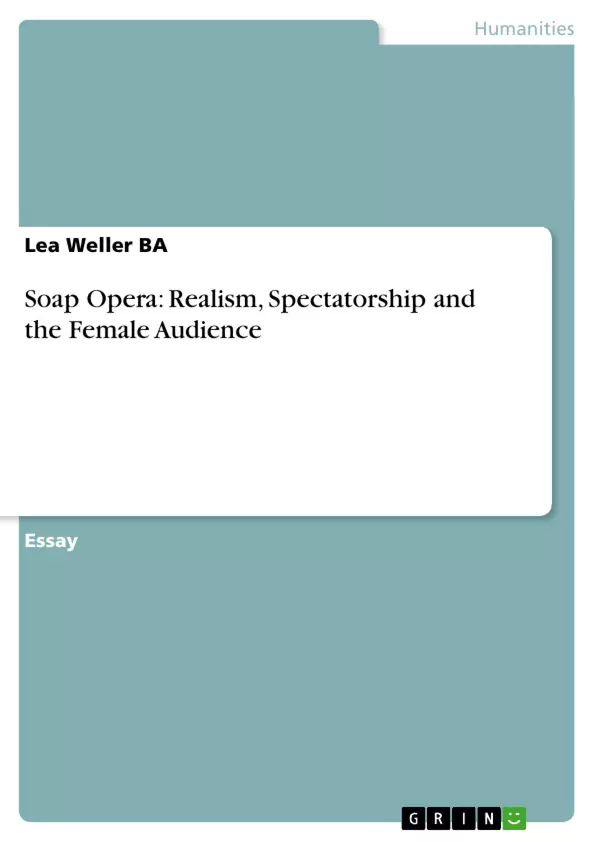The soap opera is classed as a woman’s genre in which a fictional discourse of current affairs is discussed as speculated gossip. Charlotte Brunsdon (1995, 1997) has stated that the British soap opera has specific conventions, which make it a soap opera. Realism in a soap opera reflects the issues that are evident in society today and recognised by a female audience, allowing the viewer to connect with specific plots and characters. Brunsdon had become interested in the sudden intriguing criticisms of the feminist critics who argued about how the representations of the personal home life became an intriguing object of study.
Inhaltsverzeichnis (Table of Contents)
- Realism, Spectatorship and the Female Audience
- Realism and the Soap Opera
- Feminist Ambivalence
- Soap Operas and the 'Ideal Mother'
- The Hermeneutic Speculation of the Soap Opera
- Predictability and Recognisability
- Unrealistic Realism
- Soap Operas and the 'Personal is Political'
- Feminist Criticism of the Soap Opera
- The Taboo of the Soap Opera
- EastEnders and the Younger Audience
- External and Internal Realism
- Realism and Credibility
Zielsetzung und Themenschwerpunkte (Objectives and Key Themes)
This text explores the relationship between realism, spectatorship, and the female audience within the context of British soap operas. The study focuses on how soap operas represent and reflect social issues, engaging viewers through a sense of familiarity and relatable narratives. The text examines feminist perspectives on soap operas and their portrayal of women’s lives, analyzing how the genre may contribute to both the reinforcement and critique of traditional gender roles.
- The role of realism in soap operas and its connection to societal issues
- Feminist perspectives on soap operas and the concept of feminist ambivalence
- The portrayal of women and their lives in soap operas, including the "ideal mother" archetype
- The engagement of the female audience with soap opera narratives and the creation of a shared fictional discourse
- The cultural significance of soap operas and their enduring popularity
Zusammenfassung der Kapitel (Chapter Summaries)
The chapter delves into the genre of soap opera, particularly its categorization as a woman’s genre. It explores Charlotte Brunsdon’s argument that British soap operas employ specific conventions that define their genre. The chapter discusses how realism in soap operas reflects contemporary societal issues, allowing female viewers to connect with storylines and characters. Brunsdon’s interest in the criticisms levied by feminist critics, who questioned the representation of personal home life, is highlighted. The chapter also introduces the viewpoints of Tania Modleski and Annette Kuhn, who further analyze the role of soap operas in female spectatorship. Modleski’s perspective underscores the never-ending nature of soap operas, mirroring the continuous trials and tribulations of real life. Kuhn builds upon these insights, examining the complexities of gendered spectatorship and how soap operas transcend patriarchal modes of subjectivity. The chapter also explores the notion of soap operas constructing the ideological and moral framework of a woman’s home life, catering to both female and feminine audiences.
This chapter examines the hermeneutic speculation that arises from watching soap operas, contributing to the pleasure of a female audience. The use of cliffhangers and plot revelations is analyzed, highlighting how these elements entice viewers to continue watching. The chapter analyzes the example of Coronation Street, demonstrating how producers utilize advert breaks to heighten viewer anticipation. The role of audience speculation and the creation of a fictional discourse among female viewers are emphasized. Charlotte Brunsdon’s argument that the predictability and familiarity of soap opera narratives draw viewers in is presented. Despite the seemingly unrealistic nature of the storylines, the chapter argues that soap operas portray recognizable conventions that resonate with female audiences.
The chapter delves into the consequences faced by soap opera characters, emphasizing the lack of happy endings in the genre. Brunsdon’s observation that characters often leave the program to achieve a sense of closure is discussed. The counterbalance of comedy and tragedy in soap operas is also examined, with Coronation Street serving as an example. The chapter explores the concept of viewer engagement, acknowledging that while audiences may not connect with every character or plot, they can still find resonance in specific aspects of the narrative. Brunsdon’s analysis of feminist critics' increasing interest in soap operas is presented, highlighting the theory of "the personal is political." This theory emphasizes the significance of the home and personal life in relation to women's oppression and the media's role in representing these dynamics.
Schlüsselwörter (Keywords)
Key terms and concepts central to this text include: realism, spectatorship, female audience, soap operas, British television, feminist perspectives, feminist ambivalence, gender roles, social issues, narrative conventions, character representation, "the personal is political", and media construction.
- Arbeit zitieren
- Lea Weller BA (Autor:in), 2010, Soap Opera: Realism, Spectatorship and the Female Audience, München, GRIN Verlag, https://www.hausarbeiten.de/document/264581


